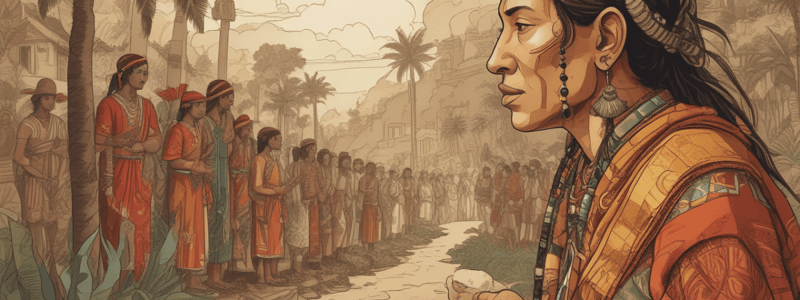Podcast
Questions and Answers
What is the main characteristic of the heroes mentioned in the passage?
What is the main characteristic of the heroes mentioned in the passage?
- They were all clergy members
- They were all wealthy
- They were all courageous and stood up against oppression (correct)
- They were all explorers
What was Bartolome de Las Casas' occupation?
What was Bartolome de Las Casas' occupation?
- Historian
- Teacher
- Clergyman (correct)
- Explorer
Who did Bartolome's father explore the New World with?
Who did Bartolome's father explore the New World with?
- Vasco da Gama
- Christopher Columbus (correct)
- Ferdinand Magellan
- Hernando Cortes
What was an encomienda?
What was an encomienda?
Why did many Old World Europeans believe they had the right to take over the New World?
Why did many Old World Europeans believe they had the right to take over the New World?
What did Bartolome Las Casas earn degrees in?
What did Bartolome Las Casas earn degrees in?
What did Bartolome's father receive from the Spanish Crown?
What did Bartolome's father receive from the Spanish Crown?
What event in 1516 erased Las Casas' efforts towards reform?
What event in 1516 erased Las Casas' efforts towards reform?
What was the name of the region where Las Casas worked to peacefully integrate with the indigenous populations?
What was the name of the region where Las Casas worked to peacefully integrate with the indigenous populations?
What was the main argument of Sepulveda in the Valladolid debates?
What was the main argument of Sepulveda in the Valladolid debates?
What was the result of Las Casas' efforts towards reform in the 1540s?
What was the result of Las Casas' efforts towards reform in the 1540s?
What was the outcome of the Valladolid debates?
What was the outcome of the Valladolid debates?
What was the main theme of the written work Las Casas published in the 1550s?
What was the main theme of the written work Las Casas published in the 1550s?
What was Las Casas' stance towards the conquests of the Americas by Spain in his later years?
What was Las Casas' stance towards the conquests of the Americas by Spain in his later years?
What was the result of Las Casas' publication of his account of the destruction in the New World?
What was the result of Las Casas' publication of his account of the destruction in the New World?
Study Notes
Bartolomé de Las Casas
- Bartolomé de Las Casas was a Spanish clergyman who dedicated his life to defending the indigenous people of the Americas during the Age of Exploration.
Las Casas' Family Background
- Las Casas' father explored the New World with Christopher Columbus, and the family grew wealthy through an encomienda (a grant giving them the right to demand payment and enslavement of indigenous people) on Hispaniola.
Las Casas' Early Life
- Bartolomé Las Casas chose the priesthood, becoming a master of Latin and religious studies, earning two degrees in these fields.
Witness to Atrocities
- In the early 1500s, Las Casas witnessed a massacre of indigenous people in the New World, declaring it a mortal sin and renouncing his family's land holdings in Hispaniola.
Reform Efforts
- Las Casas petitioned King Ferdinand of Spain for reform over the fair treatment of indigenous people, but the king's death in 1516 erased the progress made.
The Verapaz Experiment
- In 1537, Las Casas led a group of missionaries to the region of present-day Guatemala, peacefully integrating with the indigenous population, and the area was named Verapaz (true peace).
Rise to Bishop and the New Laws of 1542
- By the 1540s, Las Casas became a bishop and lobbied for the New Laws of 1542, limiting the encomienda system and its abuses.
The Valladolid Debates
- Las Casas participated in the Valladolid debates, arguing that the indigenous people were free and deserving of equal treatment, against Sepulveda, who argued for natural slavery.
Later Life and Legacy
- Las Casas continued to spread his beliefs through writing, including a graphic account of the destruction he witnessed in the New World, and eventually claimed that all Spanish conquests in the Americas were morally reprehensible.
- He died in 1566, but his efforts contributed to raising awareness about the injustices faced by indigenous peoples.
Studying That Suits You
Use AI to generate personalized quizzes and flashcards to suit your learning preferences.
Description
Learn about the life and legacy of Bartolome de Las Casas, a Spanish colonist who fought for the rights of indigenous peoples in the Americas.




